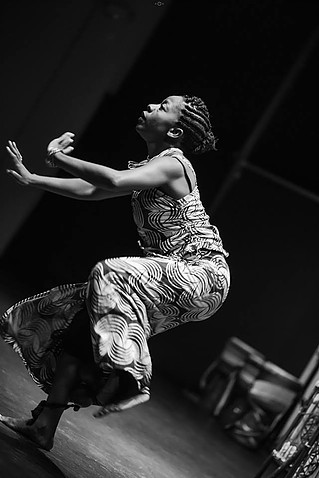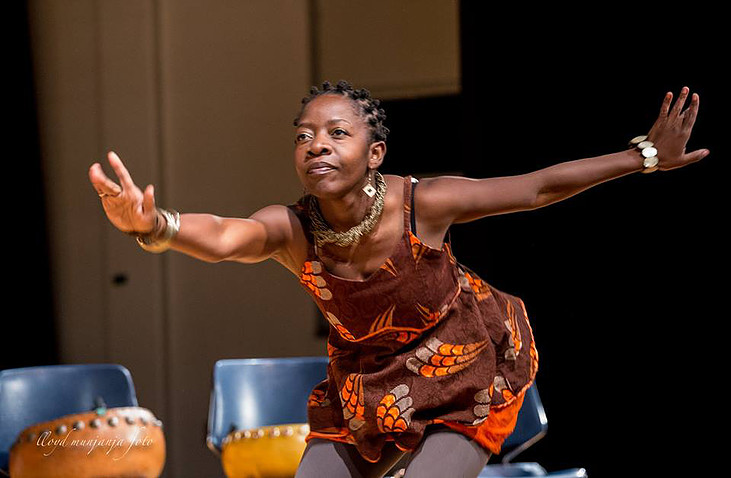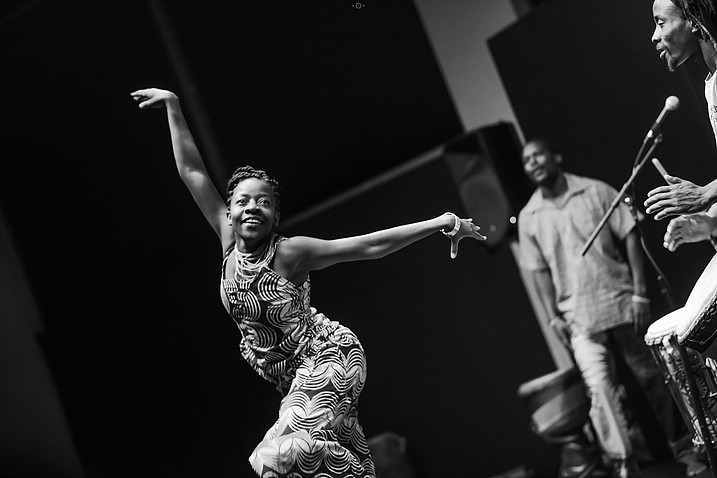Bringing African Dance into the Larger Conversation
An Interview with Rujeko Dumbutshena
BY EMMALY WIEDERHOLT
Originally from Zimbabwe, Rujeko Dumbutshena is a contemporary African dance artist currently living in Albuquerque, New Mexico. Her artistic statement describes herself as: “representing the roots of my people while embracing the vibrant evolution of our culture.” In this interview, she discusses African dance’s place in the Western world.
~~
Where do you most commonly derive inspiration for your work?
When most people think of African dance, their conception is usually based in entertainment. When African dance is performed at an event, the presenters are looking for something to fill the entertainment requirements. That comes up a lot for me. But when I get that rare choreographic opportunity, I derive my inspiration from women: women’s stories, women’s spaces, women’s triumph’s, etc.
Is it important to you to have your work viewed through the lens of being female/African, or do you want people to see your work without those identity associations?
It’s impossible as a black female dancer to think that people will just view my work on its own. I recognize that who I am is a big imprint on anything I do. However, I actually most identify as an immigrant. What’s imposed on me is that I’m a black woman, but I think it’s infused with being from a different culture. That adds a different element to what I make.
I’m very aware that I’m making art right here and now; I’m influenced by the fact I’m showing my work to an American audience. When performing African movement and music in front of an American audience, there’s no doubt in my mind they’re reading me in a certain way that differentiates me from them. Because the audience’s knowledge of African dance and music is often minimal or distorted, I often feel like I’m educating people. Part of my task as a choreographer is making the dance, music and story be relatable to people no matter where they’re from. I’m trying to tackle universal themes in my work, even though the root of what I’m doing is based in African music and movement.
How would you describe your choreography?
I would say it is contemporary African movement. Either that or, if I’m staging something for an event, what I’m doing is neo-traditional African dance. In the second case, it errs more toward traditional, even though I’m not sticking to the specific forms of the dances. I blend a lot of movements from different dances together. I stretch African dance. I wouldn’t describe what I do as traditional because traditional dance developed in certain contexts, and a lot of the dances rarely happen in those traditional contexts anymore.
What changes do you perceive are necessary in the dance world in order to achieve a more universal and diverse representation of voices?
In institutions, there is a hierarchy of dance forms, and ethnic dances are definitely the bottom of the totem pole. A start in reversing this would be institutionally recognizing that cultural dance forms are equally as valid as ballet or modern dance. I think it’s important for the dance world to recognize the technique and aesthetic of African dance as being valuable to dance in general. A path to that is finding recognition in universities and colleges; more college programs are including African dance as part of their curriculum. I also think we need more representation on formal concert stages.
I’m currently working toward my MFA and, through doing this degree, I hope to have more potential to influence the larger dance conversation. It’s difficult to enter that world if your voice isn’t already part of the conversation and your dance form isn’t commonly represented on concert stages. It’s easier if you can position yourself in an institution where you can be part of the conversation. In terms of choreography, I’m trying to assess what is currently valued, match those values, and also bring in a different aesthetic.
What do you hope is your contribution to the dance world?
I want to be part of the conversations in dance that right now focus on ballet or modern. I want to represent African dance in a way where people can value it in the same light as Western classical dance styles. African dance is constantly being recreated, and there are many extremely talented African dance artists creating work right now. I want to position myself in such a way so as to help give more opportunities to that community of artists and to allow for their expressivity within mainstream dance institutions. This is where I’m coming from.
~~
Rujeko Dumbutshena is a Zimbabwean-born dancer, pedagogue and scholar who specializes in contemporary African dance. She is currently on the dance faculty at the Central New Mexico Community College. Before moving to New Mexico, she served as a faculty member at Sarah Lawrence College for eight years. Rujeko is also an MFA candidate at the University of New Mexico. She teaches neo-traditional and contemporary African dance, and is also conducting scholarly research on the interplay of gender and power in the rainmaking rituals of communities in southern Africa.
To learn more about Rujeko’s work, click here.



